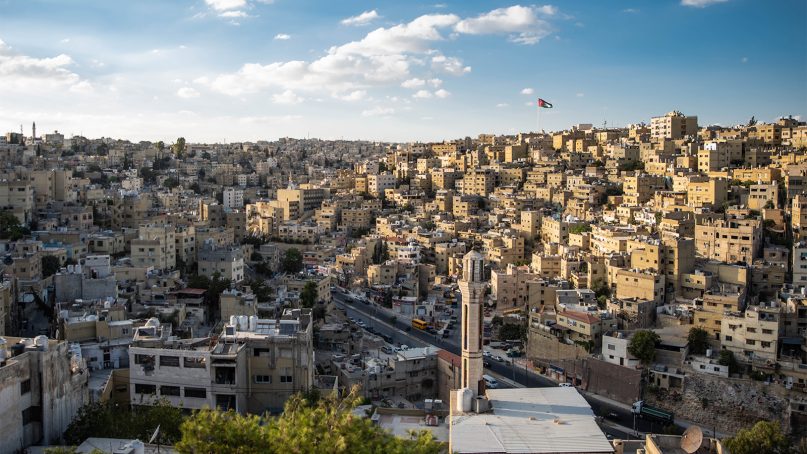AMMAN, Jordan (RNS) — After navigating the congested streets and traffic circles in Amman to make it home in time for iftar — a meal to break the fast each evening during the holy month of Ramadan — Mohammed Firas waits for the call from the minaret to mark the end of fasting for the day.
Taking a sip of water and a bite out of the dates set before him, he sits for a moment to savor his friends around the dinner table before the meal begins. On the table is his mother’s mulukhiyah (a kind of stew made of leafy greens), bread, rice, chicken and finger foods like sambousek and kibbeh.
Around the table, the friends talk about anime shows, the difficulties and blessings of fasting, and politics.
Some discuss international relations and regional tensions, but Firas’ concerns lie much closer to home. Frustrated with the current state of affairs in the Hashemite Kingdom of Jordan, he expresses a desire to depart.
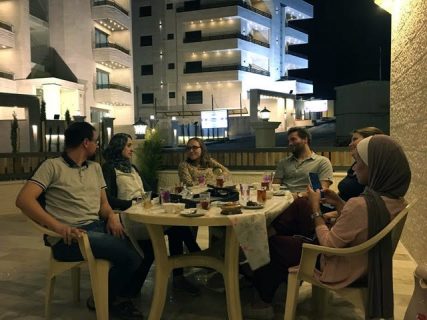
Friends gathered for an iftar meal catch up and discuss life, politics and the future on the south side of Amman, Jordan. RNS photo by Ken Chitwood
“Sometimes, I don’t know if it is worth it to stay. I wonder if I should just leave to start over somewhere new,” he said.
Although Ramadan is meant to be a month of prayer, self-discipline and charity toward those less fortunate, it also provides opportunities for reflection on the social and political realities for young Jordanians uncertain about their kingdom’s future.
While some remain optimistic about the state of the country, many others this Ramadan express a certain pessimism and hopelessness.
Jordan is often considered a steady ship in a sea of chaos in the Middle East. However, a year of protests, continuing economic decline and social frustrations over what is seen as poor governance have brought frustrations in the kingdom to new, and worrisome, levels.
The pressures come from both inside and outside the kingdom.
Positioned amid Syria’s ongoing internecine conflict, Iraq’s seemingly endless sectarian strife, Egypt’s authoritarian governance and the ceaseless strain between Israel and Palestine, Jordan’s relative calm seems quasi-miraculous.
RELATED: What is Eid and how do Muslims celebrate it? 6 questions answered
Add to this context the recent saber-rattling between the U.S. and Iran, and sentiments among young Jordanians take on understandably worried tones.
After noon prayers in the blissfully climate-controlled interior of the Al Hussein Bin Ali Mosque in Aqaba, men of different ages gather in small circles to find respite from the midday heat, which only exacerbates the feelings of discomfort and exhaustion brought on by fasting from food and drink all day.
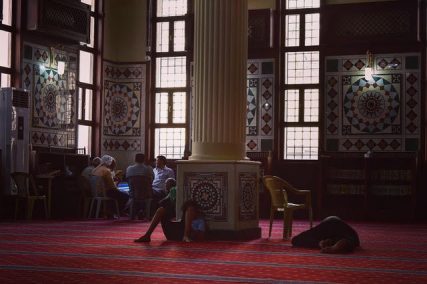
Men young and old gather in the Al Hussein Bin Ali Mosque in Aqaba, Jordan, to discuss fasting, family and politics. RNS photo by Ken Chitwood
In one corner, I strike up a conversation with Salaamu, a young man who worked at the seaport in Jordan’s most southern city, on the Red Sea coast. For safety reasons, he asked that only his first name be used.
More potent to Salaamu than the fatigue of fasting is the fear he feels for Jordan’s future.
“We are afraid,” he said, “Trump and America have not learned the lessons of Iraq, Afghanistan. No war in this region is quick and easy. Why start a war with Iran? Why make things worse in Palestine?
“Everyone in Jordan is afraid right now,” he said.
Back in Amman, Firas continues to be concerned with more domestic issues. After breaking the fast together at a local restaurant that serves date smoothies, he shows me a video from protests he participated in during Ramadan 2018.
Gathering at one of the city’s many traffic interchanges — the Fourth Circle — the largely peaceful protests saw a mix of Jordanians from across social classes gather in the evening hours after iftar from May 30 to June 7 last year to challenge austerity measures and new taxes that many saw as adding more strain on an already overburdened and underemployed populace.
The protests led to the resignation of then-Prime Minister Hani Mulki, a freeze on fuel and electricity price hikes, and the withdrawal of an unpopular tax bill.
“We felt like we had achieved something, real change,” said Firas.
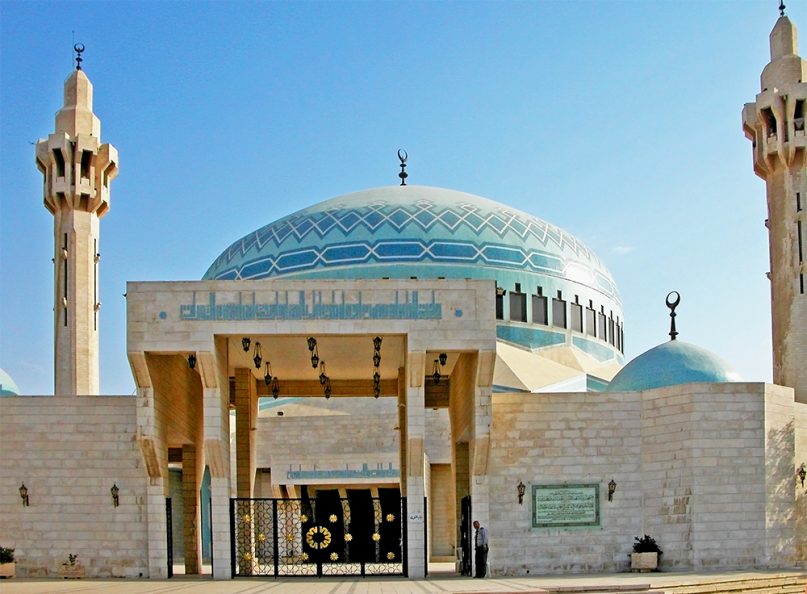
The King Abdullah I Mosque in Amman, Jordan, hosts up to 3,000 Muslims for Friday prayers each week. Photo by Dennis Jarvis/Creative Commons
Yet, months later, frustrations flared up again as the economic situation deteriorated even further, the cost of necessities such as food and rent rose even higher and corruption continued to plague the government of the current prime minister, Omar Razzaz.
Then, in late 2018, the Economic and Social Council headed by a trusted adviser to King Abdullah II, Mustafa Hamarneh, issued a scathing report on Jordan’s nepotism, ineptitude and corruption.
The ESC’s “State of the Country” report outlined how economic growth plans and job creation schemes in Jordan get bogged down in a tangled mess of bureaucracy, impassivity and incompetence. For example, from 2002-2019, nine different government strategies meant to stimulate the economy and address unemployment failed to produce any tangible results, according to the report.
Turnover and turmoil in Jordan’s democracy haven’t helped. Since 2000, there were 11 different governments with 370 different ministers, nearly 70 percent of whom had no political experience to speak of.
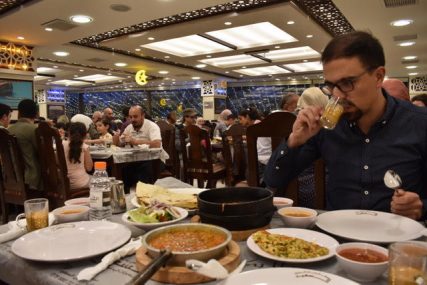
Breaking the Ramadan fast at iftar provides opportunities for eating and drinking seasonal specialties. RNS photo by Ken Chitwood
Young people across the country are particularly unsettled with the current state of affairs. The official unemployment rate for Jordan lies at 18 percent, according to the World Bank, but is as high as 40 percent for those under 25. Even with college degrees, it can take years for young people in Jordan to find employment.
A report from the Friedrich Ebert Foundation in cooperation with TNS Infratest Political Research and the University of Leipzig, Germany, found that two-thirds of young people (aged 18 to 30) work only part time or not at all and nearly half of those employed do so on a contingent basis.
Young people wrestle with emigrating for better opportunities or sticking around to cope with the uncertainty that faces them at home.
Like Firas, Nadine Asad fears the uncertainty.
A Jordanian with a degree in Middle Eastern studies from the University of Toronto, she returned to Jordan despite having opportunities abroad.
“Lots of people are looking towards immigration and have a very negative outlook, but still remain loyal to Jordan and what it stands for,” Asad said.
At the same time, “there is a lot of apathy and disassociation because people believe they can’t effect change or because they are too busy with life to put in the effort,” she said.
The pace of modern life and a lack of public spaces make it hard for young Jordanians to come together, she said. At Ramadan, however, life slows down and social gatherings become more common.
“At Ramadan, there is always an increase in social interactions amongst people, and with it comes talk about politics,” Asad said. “Ramadan is like the January of the Middle East — everyone tries to stay fit, get more religious, make changes — but how far those resolutions carry on is an open question,” she said.
“The sense is that major change is coming to Jordan,” she said, “but whether this is positive or negative, we are uncertain.”
